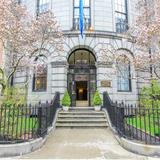- Quincy College is a municipally affiliated, comprehensive community college addressing the educational, training and cultural needs of Greater Quincy and Plymouth, metropolitan Boston, and the South Shore of Massachusetts. The College is an open access institution which values achievement, diversity, economic opportunity, and life-long learning. Excellence in learning and teaching is emphasized in all college programs.
School Highlights
Quincy College serves 4,377 students (24% of students are full-time).
The college's student-teacher ratio of 19:1 is higher than the state community college average of 12:1.
Minority enrollment is 55% of the student body (majority Black), which is less than the state average of 57%.
Quick Facts (2026)
- Enrollment: 4,377 students
- In-state tuition: $4,846
- Out-state tuition: $4,846
- Student-teacher ratio: 19:1
- Minority enrollment: 55%
- Source: Integrated Postsecondary Education Data System (IPEDS)
Top Rankings
Quincy College ranks among the top 20% of public schools in Massachusetts for:
School Overview
The teacher population of 234 teachers has stayed relatively flat over five years.
Quincy College
(MA) Community College Avg.
Carnegie Classification
Associate's Colleges: High Transfer-High Nontraditional
Associate's Colleges: Mixed Transfer/Career & Technical-Mixed Traditional/Nontraditional
Institution Level
Four or more years
At least 2 but less than 4 years
Institution Control
Public
Public
Total Faculty
234 staff
290 staff
School Calendar
Student Body
The student population of Quincy College has grown by 38% over five years.
The student-teacher ratio of 19:1 has decreased from 32:1 over five years.
The Quincy College diversity score of 0.73 is less than the state average of 0.74. The school's diversity has stayed relatively flat over five years.
Total Enrollment
4,377 students
2,687 students
Student-Teacher Ratio
19:1
12:1
# Full-Time Students
1,070 students
1,039 students
# Part-Time Students
3,307 students
1,648 students
# Enrollment Undergraduate
437 students
278 students
# Full-Time Undergraduate Students
1,070 students
839 students
# Full-Time Graduate Students
n/a
217 students
# Part-Time Undergraduate Students
3,307 students
1,619 students
# Part-Time Graduate Students
n/a
346 students
Total Dormitory Capacity
n/a
400 students
% American Indian/Alaskan
n/a
n/a
% Asian
9%
6%
% Hispanic
9%
21%
% Black
21%
15%
% White
45%
43%
% Hawaiian
n/a
1%
% Two or more races
3%
3%
% Non Resident races
3%
2%
% Unknown races
9%
9%
Diversity Score
0.73
0.74
College Completion Rate (Students who graduate in less than 4 years)
14%
21%
College Completion Rate (Students who graduate in 4 years or more than 4 years)
16%
45%
Average Graduate Earnings (10 Years)
$42,000
$35,500
Tuition and Acceptance Rate
The public in-state tuition of $4,846 is more than the state average of $4,424. The in-state tuition has declined by 30% over four years.
The public out-state tuition of $4,846 is less than the state average of $9,401. The out-state tuition has declined by 30% over four years.
In-State Tuition Fees
$4,846
$4,424
Out-State Tuition Fees
$4,846
$9,401
Tuition Notes
$273 - $950 per credit
% Students Receiving Some Financial Aid
61%
87%
Median Debt for Graduates
$14,000
$11,249
Median Debt for Dropouts
$7,000
$5,500
Acceptance Rate
n/a
75%
SAT Reading
n/a
540
SAT Math
n/a
535
SAT Writing
n/a
480
ACT Composite
n/a
21
Source: 2024 (or latest year available) Integrated Postsecondary Education Data System (IPEDS) , School Administrators
School Notes
- Quincy College provides quality, affordable, community responsive associate degree, non-credit and certificate programs. As a college of the community, Quincy College is committed to the development of partnerships with government, business, industry, schools and community agencies to enhance educational opportunity, global perspective, economic development, and the quality of life. The Quincy campus is conveniently located in historic downtown Quincy, Massachusetts. Quincy Campus offers numerous programs of study awarding Associate degrees and certificates of completion in Business, Computer Science, Criminal Justice, Early Childhood Education, Fine Arts, Fire Science Technology, Human Services/Social Work, Liberal Arts, Legal Studies and Nursing. In addition to a high-quality education from top instructors, the Quincy campus offers resources for our students including student advising, student life services, a computer lab, photo and art studios, Quincy College Anselmo Library, tutoring, a career center, Charlie's Café, Quincy College Bookstore, and more. Quincy College is accredited by the New England Association of Schools and Colleges, Inc. through its Commission on Institutions of Higher Education. Accreditation of an institution of higher education by the New England Association indicates that it meets or exceeds criteria for the assessment of institutional quality periodically applied through peer review process.
- Sample of notable school alumni/alumnae:
- Dr. Richard DeCristofaro, President -
Frequently Asked Questions
How much does Quincy College cost?
Quincy College's tuition is approximately $4,846 for In-State students and $4,846 for Out-State students.
Who are famous alumni from Quincy College?
Quincy College famous alumni include: Dr. Richard DeCristofaro, President.
What is Quincy College's ranking?
Quincy College ranks among the top 20% of community college in Massachusetts for: Least expensive tuition and Diversity in US community colleges.
Recent Articles

Community College vs. Bootcamps for Tech Careers in 2026
Community college vs. bootcamps in 2026. Compare cost, outcomes, credentials, and hiring trends to choose the best tech career path.

How to Build a Class Schedule That Fits Your Life (Spring 2026)
Learn how to build a class schedule that fits your life with expert tips, updated strategies for Spring 2026, and practical planning tools for students and families.

Top 10 Jobs for Community College Graduates in 2026
Meta Description: Discover high-demand jobs for community college graduates, with current salary trends, costs, and career pathways.











